COVID updates: Authorities probe recently-vaccinated woman’s death
Australia’s Chief Medical Officer Paul Kelly is urging Australians over 50 to take the COVID jab, as colleagues paid tribute to a NSW woman that died after taking the jab.
Coronavirus
Don't miss out on the headlines from Coronavirus. Followed categories will be added to My News.
Australia’s Chief Medical Officer Paul Kelly urged people over 50 to take the AstraZeneca vaccine following the death of a NSW that took a coronavirus jab.
“Clotting is a feature of COVID. It also happens to be a feature, very rarely, of this AstraZeneca vaccine,” Professor Kelly said this afternoon.
“But the benefit absolutely, particularly for those over 50, outweighs significantly the risk
of that particular event from the AstraZeneca vaccine.”
Health authorities were due to meet late today to determine whether the 48-year-old woman’s death was linked to the AstraZeneca vaccine.
Professor Kelly said if people had concerns thy should at least have a conversation with their vaccine provider before cancelling their appointment.
He was unable to say how many people had cancelled their AstraZeneca jab following reports of the blood clot complications.
“If you are in the 1A or one big group (1B), that means you are either at higher risk of severe COVID disease or you are a crucial worker looking after people at higher risk of COVID disease, when you have the chance to get your vaccine, please go and get your vaccine,” he said.
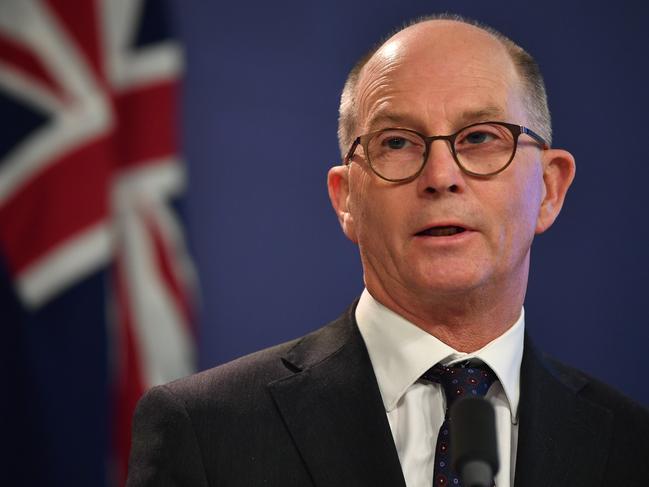
“Roll up to your GP, or whenever you can get your vaccine provided, have a talk to your vaccine provider if you have concerns, but please do not cancel your appointment. Go and at least have the conversation, take the vaccine because that is the way we’re going to get on top of the COVID situation in Australia.”
He said 1.420 million doses of COVID vaccine have been administered nationally but was unable to give a break down on how many were the Pfizer vaccine.
Professor Kelly said any change in the way that we deal with people coming across our border increases the risk of incursion of cases into the Australian population.
One of the key elements at National Cabinet will be the rollout of the vaccination in Australia.
“We are currently very vulnerable, because essentially we’re completely open and all of those COVID-safe measures that have been in place for almost a year now, almost all of those have been removed because we’re able to do that. But it does increase the opportunity for the virus to circulate.
“At the moment, only 5 per cent or so of the adult population of Australia have been vaccinated, we need to continue to increase that and that will continue to increase the protection for Australians.”
He said health authorities were also looking at the duration of the effectiveness of the coronavirus vaccines.
”Let us think about it, the first ever vaccines that were used in clinical trials, and they were the Pfizer vaccine and the donor vaccine shortly after that, the AstraZeneca vaccines, only got started in about April last year. So we are only just now at the point of one year post the very first vaccines used in phase one clinical trial,” he said.
“Phase three clinical trial participants are being followed up for one or two more years, so we will get some good information, but we’re early that phase.”
‘IT’S SHOCKED EVERYONE’
The preliminary meeting of Therapeutic Goods Administration (TGA) Vaccine Safety Investigation Group will be the first of a series of reviews into the death of the frontline worker who was vaccinated on Friday.
The Central Coast woman, a diabetic with serious underlying health issues, died at John Hunter Hospital yesterday after developing blood clots.
While preliminary tests have so far not found a conclusive link between the death and the vaccine, health authorities are not ruling one out.
In a separate incident, it can be revealed the TGA is also investigating the death of a 66-year-old man from the NSW mid-north coast who died 10 hours after receiving an AstraZeneca jab on Tuesday.
However, health authorities at this stage do not believe there to be a link between the death and the vaccine.
It is understood the Tinonee man also had underlying health issues.
A Department of Health spokesperson said the TGA was seeking further clinical information, including clinical test results from NSW Health as part of its investigation into the woman’s death.
The clotting disorder being investigated in connection with the AstraZeneca COVID-19 vaccine – thrombosis with thrombocytopenia syndrome (TTS) – has been confirmed in two cases out of over 700,000 people who have received the vaccine in Australia.
“It has not yet been established whether there is any link between the COVID-19 vaccine and the tragic death reported by NSW health officials,” the spokesperson said.
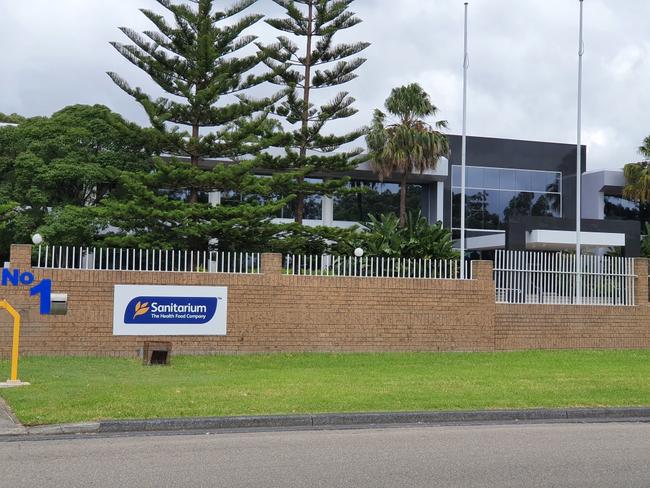
The woman worked at Sanitarium on the Central Coast.
The Sanitarium factory was quiet on Friday afternoon as workers left for the weekend with the business closing at 12pm.
A number of factory workers leaving were shocked to hear the woman was a colleague from Sanitarium and said they hadn’t been informed by management at this stage.
“I heard about it on the news, it’s shocked everyone,” one woman said.
“I didn’t realise she worked here.”
A company spokesman told News Corp: “The company is saddened by the loss of a much loved employee and we offer our heartfelt condolences to her family, friends and workmates.
We understand the case is under investigation by the coroner and health department.”
“It has not yet been established whether there is any link between the COVID-19 vaccine and the tragic death reported by NSW health officials,” the federal health department said in a statement on Thursday.
NSW Premier Gladys Berejiklian has said she’s waiting to hear back from federal health authorities investigating whether there is any link between a woman’s death and the AstraZeneca coronavirus vaccine.
A 48-year old women has died from blood clot days after receiving the AstraZeneca COVID jab. NSW Premier Gladys Berejiklian comments on the ongoing investigation. #9Todaypic.twitter.com/h0wnU42ykW
— The Today Show (@TheTodayShow) April 15, 2021
“I know as much as you do,” she told the host of the Today Show.
“All I do know is that the federal authorities are looking into these matters to see if there is that link. And in the meantime we just extend our heartfelt condolences to the family and loved ones during this difficult time.”
Appearing on the Sunriseprogram moments later, Ms Berejiklian said she will update the public as soon as more information becomes available.
“I want to assure everybody that whenever we get information that is relevant, we always make sure we convey it as soon as we can, but there's nothing further we have to update,” she said.
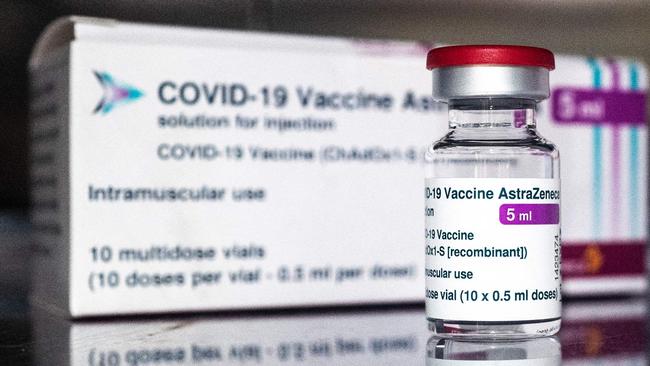
“We’re relying on the federal authorities (to say) if there is a link or not, whether it’s a horrible coincidence.”
That’s out of a total of more than 700,000 people who have received that type of vaccine.
“NSW Health has said there is no confirmed link but further investigations are underway,” the spokesman said.
The TGA said the blood clotting disorders being investigated in connection with the AstraZeneca COVID-19 vaccine are very rare and differ from common blood clots or venous thromboembolism, which occur in around 50 Australians every day.
In the UK, where the vaccine rollout has come much further, the ratio of blood clotting cases to jabs is even smaller.
At the beginning of the month the BBC reported that only 30 blood clotting cases had been reported out of a total of 18 million AstraZeneca vaccine recipients.
Despite the low risk, the Australian Technical Advisory Group on Immunisation (ATAGI) advised the federal government last week that the AstraZeneca vaccine should mainly be given to people over 50.
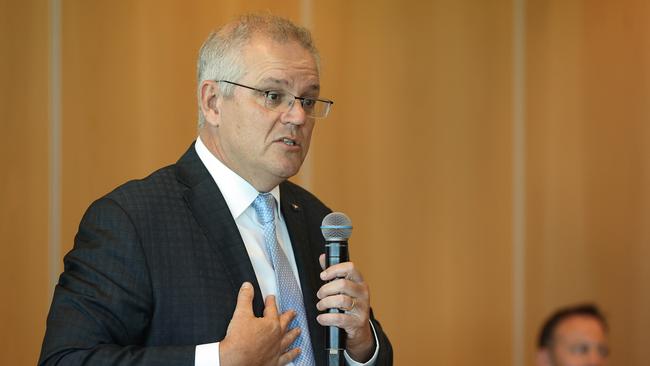
Younger people can still get the vaccine, but the consent procedures around the risk of side effects will be updated.
The advice threw the Scott Morrison government’s vaccine plans into disarray and prompted the Prime Minister to scrap an October target to have the entire willing population vaccinated, saying the situation is too volatile to commit to a timeline.
Mr Morrison bet heavily on the AstraZeneca vaccine and has ordered more than 50 million doses of the product, most of which will be made locally in Victoria.
The Pfizer-made vaccine that is considered safer has not been available in large enough quantities to meet Australia’s needs.
But the Prime Minister has put orders in for some 40 million doses that the government hopes will arrive by the end of the year.
MELBURNIANS ON COVID ALERT
Victoria has recorded zero community cases of COVID-19 for the 49th day in a row.
The doughnut figure was repeated in hotel quarantine, where zero new cases were detected.
It comes after yesterday’s spike which saw five new COVID-19 cases in hotel quarantine, the largest number since Victoria reopened its border to returning international travellers. It brought the total to eight active cases in the state’s hotel quarantine system.
More than 14,000 tests returned a negative result while state health services administered 3,265 vaccine doses.
It comes as millions of Melburnians are being urged to monitor for symptoms of the coronavirus after viral fragments were detected in a “large catchment” that services the city’s northern, western and eastern suburbs.
Traces of COVID-19 have also been detected in another catchment in Melbourne’s south east.
In a statement, the Department of Health said the “unexpected detections” could be due to a person or persons with the virus being in the early active infectious phase.
Or it could be because they were continuing to shed the virus after the infectious period, they said.
“While it is possible that these detections are due to a visitor or visitors to these areas who are not infectious, a cautious approach is being taken,” the statement read.
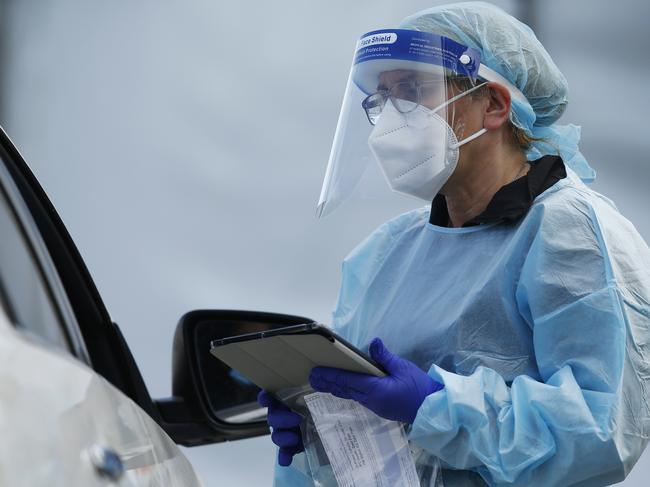
People who live in or have visited the following areas should monitor for COVID-19 symptoms and get tested if any develop:
- North, west and eastern suburbs from 4 to 12 April. This detection is in a very large catchment that services suburbs stretching from Melbourne’s northwest to the outer northeast.
- Cranbourne and surrounding suburbs from 6 to 12 April
These two new detections come after residents in about 16 suburbs were warned earlier in the week about similar wastewater discoveries.
“Coronavirus fragments have been detected in wastewater from the Ringwood area,” the Victorian Department of Health said in a statement just before 6pm on Tuesday.
The east Melbourne suburbs affected include Bayswater, Bayswater North, Boronia, Croydon, Croydon North, Croydon South, Heathmont, Kilsyth, Kilsyth South, Montrose, Ringwood, Ringwood East, Sassafras, The Basin, Tremont and Wantirna.
MASS VACCINATIONS PLAN
Scott Morrison has flagged “mass vaccination options” for Australians aged under 50, saying it may be possible that people in that age group could be immunised by the end of the year.
The Prime Minister said the rollout “has to change because of events” linked to the rare blood clots associated with the AstraZeneca vaccine in under 50s.
“That will mean we’ll need to change our rollout to go to mass vaccination options and that will have to be done in partnership with the states and territories,” Mr Morrison told The West Live podcast.
“If we can do all that, then there is the possibility that can be achieved by the end of 2021 but at this stage there are too many uncertainties I think to commit to a timetable like that, I would need and states would need to be sure they could put those arrangements in place and ramp them up and to do that safely with the population to achieve that.”
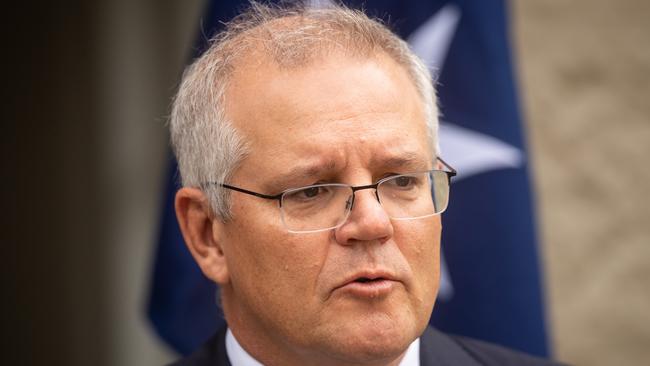
Mr Morrison downplayed concerns surrounding the AstraZeneca vaccine, saying there was a “remote risk” associated with the jab, but acknowledged the pause will “change how we do the rollout”.
During a press conference on Wednesday, the Prime Minister said, “the critical thing right now is we must be vaccinating those most vulnerable in our community.”
He continued, ”I want to stress, particularly those Australians aged over 70, AstraZeneca is a safe and approved vaccine for people aged over 50. The risk to elderly Australians and vulnerable Australians of COVID is great if there is an outbreak.”
NOVAVAX SHORTAGES ANNOUNCED
Novavax has announced supply shortages have forced it to push back its production target of 150 million COVID-19 vaccine doses per month.
The delay serves another blow to the federal government’s vaccine rollout program, with Australia ordering 51 millions doses of Novavax.
The order was due to arrive in “mid-2021” but that’s now up in the air.
“We said during our earnings call that we expect all capacity to be online by around mid-year. We’re continuing to refine that timing as we get closer, which now leads us to think we’re online/at full capacity by Q3,” Novavax communications director Amy Speak told the ABC.
“There are some supply shortages that come and go that have contributed to the revision in timing. These have included things like the bioreactor bags and filters.”
Novavax is expected to get the green light from the UK’s medical regulator as early as this month after releasing positive UK test data. It will be manufactured locally in the UK but Australia will need to import the vaccine.
QLD LIFTS RESTRICTIONS
Masks will no longer be mandatory, dancing will return, and visits will resume to aged care and disability homes, hospitals and prisons when weeks of tight restrictions in Queensland come to an end on Thursday.
Premier Annastacia Palaszczuk made the welcome announcement today, more than two weeks after the state was plunged into a snap three-day lockdown to curb the spread of COVID-19 after two separate clusters emerged from the Princess Alexandra Hospital.
At least 19 cases have been linked to the two clusters, which spread after a doctor and nurse at the hospital became infected while treating a returned traveller.
Ms Palaszczuk thanked Queenslanders for their “mighty job”.
“It has not been easy … But by doing that we’ve kept everyone safe,” she said.
“I won’t say there won’t be future cases where we have to wear masks, I don’t know the future, but we are easing restrictions.
“(And) Dr Young said there are no issues with easing restrictions from 6am (instead of 12pm).”
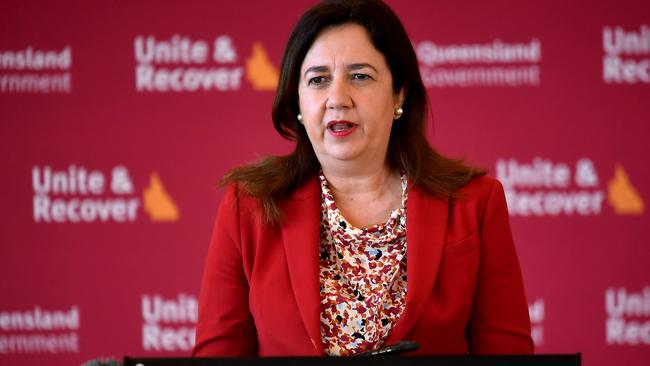
What will change from 6am Thursday:
- Masks will no longer be mandatory indoors except at airports, but Queenslanders will be encouraged to carry one and wear it on public transport or where social distancing is not possible
- Standing will be allowed at pubs and clubs while eating and drinking
- Visitors at private residences will increase to 100
- Visitors will be permitted at aged care and disability care homes, hospitals and correctional facilities
- Dancing at nightclubs and indoor venues will be permitted
- Weddings and funerals will be allowed to host 200 guests
- Outdoors there will be no restrictions on gatherings
- Ticketed venues and open-air stadiums will be able to return to 100 per cent capacity
PM TAKES DRASTIC ACTION OVER VACCINE ROLLOUT
The Prime Minister has demanded the country’s leaders and health authorities ramp back up to a war footing, admitting the failing COVID-19 vaccine program faces “serious challenges”.
The country’s jabs rollout has fallen well short of initial expectations, compounded further by blood clotting concerns with the AstraZeneca shot.
Scott Morrison will call on national cabinet to recommence regular meetings from Monday in a bid to “get the program back on track”.
Last week, it was announced the AstraZeneca jab won’t be offered to Australians under the age of 50 following advice from the Australian Technical Advisory Group on Immunisation.
This led to Mr Morrison refusing to commit to a timeline for the rollout to be completed after previously ensuring the nation all jabs would be provided by October.
“There are serious challenges we need to overcome caused by patchy international vaccine supplies, changing medical advice and a global environment of need caused by millions of COVID-19 cases and deaths,” he said on Tuesday.
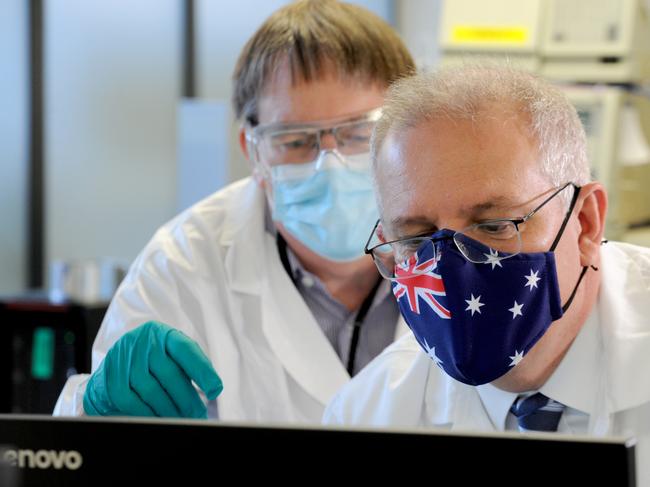
“This is a complex task and there are problems with the program that we need to solve to ensure more Australians can be vaccinated safely and more quickly.”
The state and territory leaders will return to biweekly meetings “until we solve the problems”.
“There are issues we are trying to deal with as a federal government and I have been upfront about those,” Mr Morrison said.
“But among the states and territories, they are also tackling their own unique issues and working together we are all going to be in a better position to find the best solutions.
“We are throwing everything at these issues, uniting the nation to keep the vaccination program safe, to get the rollout right and to be open and transparent about how we are tracking.”
The urgent request from the Prime Minister comes after weeks of ongoing hostility over the vaccination program, with federal members accusing state counterparts of stockpiling vaccines.
– with Ellen Ransley, James Hall, Anton Nilsson, Anthony Piovesan, Jade Gailberger, Sue Dunlevy, Tiffany Bakker
More Coverage
Originally published as COVID updates: Authorities probe recently-vaccinated woman’s death




